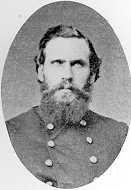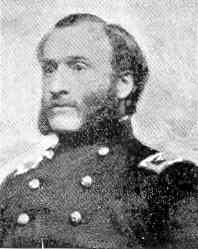Michigan in the Civil War
Browse by Name: Cutcheon, Byron Mac
Cutcheon, Byron Mac, 1836-1908.
This collections is available online.

Byron M. Cutcheon, from Byron M. Cutcheon, The Story of the Twentieth Michigan Infantry. Lansing, 1904
Cutcheon was principal of the high school at Ypsilanti when he answered President Lincoln's call July 15, 1862. He was in the 20th and 27th Michigan Infantries, and rose from second lieutenant to colonel; brevet colonel, August 1864, for gallant service at the battle of the Wilderness and brevet brigadier general, March 13, 1865, for conspicuous gallantry at the battle of the Wilderness. He was wounded in action May 10, 1864. His personal recollections of his and his division's part in the war were written for his family. The chapters encompass "Preliminary--Enlistment--Rendezvous;" "Going to the Front;" "Washington to Fredericksburg;" "Fredericksburg, "with a vivid description of the "bloody and lamentable" battle of Fredericksburg, and an analysis of McClellan as a general; "From Fredericksburg to Louisville, "with an explanation of the demoralization of Col. A. W. Williams; "Louisville to Horse Shoe Bend," with an account of the squabble between Colonel Doolittle and Colonel Mausar over slaves to be or not to be returned to their owners, and the issuing of the paper Union Vidette; "The Battle of Horse Shoe Bend, Ky.;" "Down the Mississippi to Vicksburg" and "The Jackson Campaign;" "From Mississippi to Tennessee" and "East Tennessee Campaign" with "The Battle of Campbell Station;" "Siege of Knoxville;" "The assault on Fort Saunders"; "some Incidents of the Siege of Knoxville;" "After the Siege of Knoxville;" "East Tennessee to Virginia" and "Back to the Army of the Potomac;" "Through the Wilderness;" "To Ny River and Spottsylvania;" "Hospital Experience;" "In Front of Petersburgh" and "The Battle of the Crater;" "Incidents of the Battle of the Crater;" "After the Crater;" "Weldon Railroad and Ream's Station." "Poplar Springs Church and Beyond;" "Peebles Farm to Fort McGilvery; "and "The Winter in the Petersburg Trenches." He resigned and was honorably discharged March 6, 1865.
This collection is available on microfilm for interlibrary loan.
Longyear, John Wesley, 1820-1875.
Longyear was elected in 1862 as a Republican to the U.S. House of Representatives from Michigan's 3rd district, composed of Calhoun, Eaton, Ingham, Jackson, and Washtenaw Counties. He was reelected in 1864 and served on the Committee on Common Expenditures and as chairman of the Committee on Public Buildings. His papers include letters from a number of soldiers, most of them relating to requests for commissions or release from service. The letters include:
Henry D. Bath, of Mason, Mich., Invalid Corps, formerly Company B, 7th Michigan Infantry (Feb. 4, 1864).
Howard M. Beebe, 2nd Regiment, Veteran Reserve Corps (Jan. 17 and Jan. 28, 1865).

Byron M. Cutcheon,
from his The Story
of the Twentieth
Michigan Infantry.
Lansing, 1904.
Wilbur F. DuBois, of Lansing, Mich., was Longyear's nephew. He served in Company A, 20th Michigan Infantry, and beginning in July 1864 was second lieutenant in the 108th U.S. Colored Infantry. At least 20 letters (1863-1865), including descriptions of the battles of Spotsylvania, Cold Harbor, and Petersburg.

John A. Elder, from Wells B. Fox,
What I Remember of the Great
Rebellion. Lansing, 1892.
Charles S. Hunt, a prisoner (July 12, 1864).
James J. Jeffries, of Lansing, Mich., Company D, 14th Michigan Infantry (Mar. 15, 1864).
Franklin Johnson, of Jackson, Mich., Company K, 26th Michigan Infantry, discharged for disability Nov. 1864 (Jan. 24, Feb. 14, Dec. 9, and Dec. 15, 1864).
William D. Longyear, of Onondaga, Mich., Company C, 8th Michigan Infantry (July 3, 1864).
Hiram J. Lovejoy, of Locke, Mich., Company A, 20th Michigan Infantry (June 18, 1864).

Henry A. Morrow, from O. B. Curtis,
History of the Twenty-fourth
Michigan of the Iron Brigade.
Detroit, 1891.
Jesse W. Parker, 94th New York Volunteers, Company D (Feb. 10, Feb. 21, July 20, and Nov. 3, 1864).
David H. Patterson, of Grass Lake, Mich., Company K, 26th Michigan Infantry (Apr. 8 and Apr. 11, 1864).
Edwin P. Pitkin, 132nd Company, 1st Battalion Invalid Corps, formerly of Company H, 20th Michigan Infantry (Dec. 19, 1863).
William Richards, Company C, 17th Michigan Infantry, 3rd Division, 9th Army Corps (June 20, 1864).

John Q. A. Sessions, from his Historical
Sketch of the Seventh Regiment Michigan
Volunteer Cavalry. New York, 1893.
Homer L. Thayer, of Lansing, Mich., U.S. Volunteers, 2nd Brigade, 3rd Division, 2nd Corps, formerly Company G, 3rd Michigan Infantry, (Apr. 5 and Dec. 19, 1864).
A. C. Voris?, 8th Infantry? (Apr. 3, 1864).
N. P. Ward, 2nd Brigade, 1st Division, 3rd Corps (Mar. 12, 1864).
Testimonials (1863) to the service of George A. Woodruff (1st U.S. Artillery), Montgomery S. Woodruff (Company F, Merrill's Horse), and William S. Woodruff (Company E, 1st Michigan Infantry), from John Sedgwick, Winfield S. Hancock, George B. McClellan, Henry H. Crapo, Austin Blair, Lewis Merrill, and William A. Throop (copies).
E. L. Wright, Company G, 106th New York Volunteers (Feb. 23, 1865).